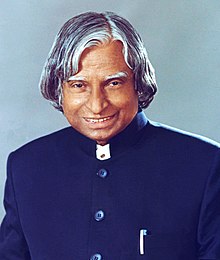
Back أبو بكر زين العابدين عبد الكلام Arabic ابو بكر زين العابدين عبد الكلام ARZ এ পি জে আব্দুল কালাম Assamese Abdul Kalam AST अब्दुल कलाम AWA Абдул Калам Byelorussian Абдул Калам Bulgarian ए. पी. जे. अब्दुल कलाम Bihari এ. পি. জে. আবদুল কালাম Bengali/Bangla Abdul Kalam Breton
A. P. J. Abdul Kalam | |
|---|---|
 Official portrait, 2002 | |
| 11th President of India | |
| In office 25 July 2002 – 25 July 2007 | |
| Prime Minister | Atal Bihari Vajpayee Manmohan Singh |
| Vice President | Krishan Kant Bhairon Singh Shekhawat |
| Preceded by | K. R. Narayanan |
| Succeeded by | Pratibha Patil |
| 1st Principal Scientific Adviser to the Government of India | |
| In office November 1999 – November 2001 | |
| President | K. R. Narayanan |
| Prime Minister | Atal Bihari Vajpayee |
| Preceded by | Office established |
| Succeeded by | Rajagopala Chidambaram |
| Personal details | |
| Born | 15 October 1931 Rameswaram, Madras Presidency, British India (modern–day Tamil Nadu, India) |
| Died | 27 July 2015 (aged 83) Shillong, Meghalaya, India |
| Resting place | Dr. A.P.J. Abdul Kalam Memorial, Rameswaram, Tamil Nadu, India |
| Political party | Independent[fn 1] |
| Alma mater | |
| Profession | |
| Awards | Full list |
| Notable work(s) | |
| Signature |  |
| Website | A. P. J. Abdul Kalam Centre |
| Scientific career | |
| Fields | Aerospace engineering |
| Institutions | |
| ||
|---|---|---|
|
(2002-2007) Books and publications Associated projects
Gallery: Picture, Sound, Video |
||
Avul Pakir Jainulabdeen Abdul Kalam BR (/ˈɑːbdəl kəˈlɑːm/ ; 15 October 1931 – 27 July 2015) was an Indian aerospace scientist and statesman who served as the 11th president of India from 2002 to 2007. Born and raised in a Muslim family in Rameswaram, Tamil Nadu, he studied physics and aerospace engineering. He spent the next four decades as a scientist and science administrator, mainly at the Defence Research and Development Organisation (DRDO) and Indian Space Research Organisation (ISRO) and was intimately involved in India's civilian space programme and military missile development efforts.[1] He thus came to be known as the Missile Man of India for his work on the development of ballistic missile and launch vehicle technology.[2][3][4] He also played a pivotal organisational, technical, and political role in India's Pokhran-II nuclear tests in 1998, the first since the original nuclear test by India in 1974.[5]
Kalam was elected as the 11th president of India in 2002 with the support of both the ruling Bharatiya Janata Party and the then-opposition Indian National Congress. Widely referred to as the "People's President",[6] he returned to his civilian life of education, writing and public service after a single term. He was a recipient of several prestigious awards, including the Bharat Ratna, India's highest civilian honour.
While delivering a lecture at the Indian Institute of Management Shillong, Kalam collapsed and died from an apparent cardiac arrest on 27 July 2015, aged 83.[7] Thousands, including national-level dignitaries, attended the funeral ceremony held in his hometown of Rameswaram, where he was buried with full state honours.[8]
Cite error: There are <ref group=fn> tags on this page, but the references will not show without a {{reflist|group=fn}} template (see the help page).
- ^ Cite error: The named reference
Britannicawas invoked but never defined (see the help page). - ^ Pruthi, R. K. (2005). "Ch. 4. Missile Man of India". President A.P.J. Abdul Kalam. Anmol Publications. pp. 61–76. ISBN 978-81-261-1344-6. Archived from the original on 25 July 2023. Retrieved 9 October 2015.
- ^ "India's 'Mr. Missile': A man of the people". 30 July 2015. Archived from the original on 25 September 2015. Retrieved 30 July 2015.
- ^ "Kalam's unrealised 'Nag' missile dream to become reality next year". The Times of India. 30 July 2015. Archived from the original on 3 January 2017. Retrieved 30 July 2015.
- ^ Sen, Amartya (2003). "India and the Bomb". In M. V. Ramana; C. Rammanohar Reddy (eds.). Prisoners of the Nuclear Dream. Sangam Books. pp. 167–188. ISBN 978-81-250-2477-4. Archived from the original on 25 July 2023. Retrieved 8 June 2020.
- ^ Amarnath k Menon (28 July 2015). "Why Abdul Kalam was the 'People's President'". DailyO.in. DailyO. Archived from the original on 13 August 2015. Retrieved 20 August 2015.
- ^ Rishi Iyengar (28 July 2015). "India Pays Tribute to 'People's President' A.P.J. Abdul Kalam". Time Inc. Archived from the original on 31 July 2015. Retrieved 20 August 2015.
- ^ Neha Singh (30 July 2015). "'People's President' APJ Abdul Kalam Buried with Full State Honours in Rameswaram". International Business Times. IANS. Archived from the original on 19 August 2015. Retrieved 20 August 2015.
© MMXXIII Rich X Search. We shall prevail. All rights reserved. Rich X Search
